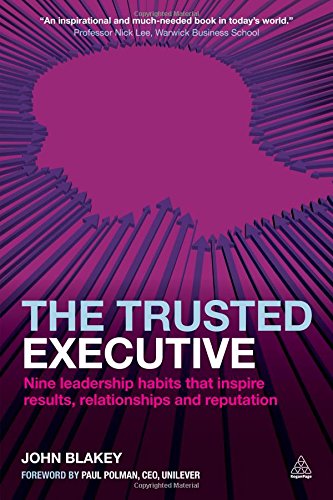Can Trust Replace Contracts?
Too often trust is thought of as a nice-to-have but vaguely soft, squishy, liberal sort of relationship thingy. Not often enough do we realize it also holds the key to reducing costs and time, and to fostering innovation and new value creation. It also mitigates risk.
It’s true: trust is highly profitable. Consider how Warren Buffett acquired McLean Distribution from Walmart. By deciding to trust the management team at Walmart, Buffett reached an agreement in a matter of days and at minimal cost, saving months and many millions in cost.
You may be saying, ‘Fine—but who’s going to double-cross Warren Buffett? It’s different for him.”
I don’t think so. Let me add my own small lesson.
To Sign a Contract? Or to Trust?
In addition to speaking and writing, I run a seminar business. I’ve spent this week training a half dozen worldwide potential trainers, sharing with them all the training manuals, approaches, ideas and concepts that I have developed over the years.
Normal procedure would be for me to have them all sign a non-disclosure agreement to protect my intellectual property, which is, after all, the source of my livelihood. Such agreements can be more or less complex. If violated, they give me the legal right to pursue redress in courts in various countries should one of my licensees/coaches/contractors abscond with my materials or be found to be using them for their own purposes without properly getting my approval or compensating me appropriately.
I could have done that.
Instead, I explained to them that I would prefer to trust them to do the right thing. We went through a 60-second ceremony. All of us raised our hands and, looking at each other, pledged two things: to respect my intellectual property in the commonsense way they felt was right; and if there was any question about what that meant, to talk to me and the rest of our team about it.
No papers. No contracts. Nothing written. Not enforceable in any court of law.
Where’s the Enforceability in Trust?
I feel more protected by this oath than I do by any legal agreement I might have signed. Why? Certainly not because it’s enforceable in a court of law.
Rather, because it’s enforceable in a higher court; the one of their conscience. Conscience is triggered by conscious, collaborative relationships between human beings.
I have no doubt that this group of people, with whom I have worked closely over several days and for months preceding this gathering, will honor the pledge. I trust them. This is partly because of who I know them to be, and also partly because I trust them.
Trust is not something you work on directly; trust is a result. It is the result of two parties interacting: one who trusts, and the other who is trusted. You can practice both trusting and being trustworthy. Probably the fastest way to make people more trustworthy is to trust them first.
Is it risky? Of course. But I think it is less risky than relying on the rather impersonal and tenuous threads of trademark law. My recourse to legal violations is courts, which are costly, time-consuming, and generally manufacture ill-will in the pursuit of their justice.
By contrast, trusting my business relationships itself increases their trustworthiness, which also lowers my risk–and at near-zero cost. My means of enforcement is pre-installed within them in the form of their consciences.
It’s a win-win. Except maybe for the lawyers.
And frankly I think there’s room for lawyers to gain from this too. But that’s another blog.



Charles,
In the instance you’re writing about trust is possibly a viable alternative. But supplying product over a period of time to a large company is another matter. Staff changes introduce complexities that can only be addressed by written agreements. What I mean is if the people you have trust agreements with leave the company there is no evidence of an agreement being established. Maybe this is stating the obvious.
BTW I retweet your articles quite often because they present valuable information to my list.
Greg
Charles,
In the instance you’re writing about trust is possibly a viable alternative. But supplying product over a period of time to a large company is another matter. Staff changes introduce complexities that can only be addressed by written agreements. What I mean is if the people you have trust agreements with leave the company there is no evidence of an agreement being established. Maybe this is stating the obvious.
BTW I retweet your articles quite often because they present valuable information to my list.
Greg
Greg, thanks for weighing in.
You are of course quite right that there are some scale limits to substituting trust for contracts; the example I gave won’t do for all cases.
However, it’s surprising how adaptable the basic concept is. For example, not all staff changes require written contracts – at a small enough scale, they could be improved on considerably by re-engaging with the new hires; in fact, it might be a very good idea to combine new meetings with new ‘trust contracts.’
However, even that only works at a small scale. The bigger question is, how to introduce trust into contracts with multi million, or billion, dollar organizations whose contracting processes are far more formal, complex, and routinized.
What I’ve found is that introduction of a little trust can have beneficial results, in unexpected ways. For example, when possible, my proposed contracts are simply several-paragraph emails. I say something like, “For our purposes, all we require is a return email with whatever minor changes you need, saying, ‘Yes, we agree’. After all, we trust you.”
What I’ve found is that it gets a wry smile from clients, a recognition that their own processes are massively complex and overweighted with their-side-specific risk mitigation clauses. Sometimes they’ll strike clauses for us; other times, I’m pretty sure they give us the benefit of the doubt on issues of difference of opinion.
It clearly changes the tone of discussion – it makes the contracting process go more smoothly. And, I’m convinced, the people with whom I’m really doing the contracting – my day to day clients – feel more tightly obligated to me. And they are the people who make the difference – not the contracts office.
On a few occasions, I have suggested replacing entire paragraphs or pages with a sentence of two, in faily clear English. Usually the intent is clear, and people appreciate the clarity that comes from simplicity over the clarity that comes from detailed precision. (Again, I’m talking about the ‘real’ clients, not the contracts office; I want my trust bond to be with the clients, primarily – although occasionally the contracts office takes on the status of client as well).
Greg, thanks for weighing in.
You are of course quite right that there are some scale limits to substituting trust for contracts; the example I gave won’t do for all cases.
However, it’s surprising how adaptable the basic concept is. For example, not all staff changes require written contracts – at a small enough scale, they could be improved on considerably by re-engaging with the new hires; in fact, it might be a very good idea to combine new meetings with new ‘trust contracts.’
However, even that only works at a small scale. The bigger question is, how to introduce trust into contracts with multi million, or billion, dollar organizations whose contracting processes are far more formal, complex, and routinized.
What I’ve found is that introduction of a little trust can have beneficial results, in unexpected ways. For example, when possible, my proposed contracts are simply several-paragraph emails. I say something like, “For our purposes, all we require is a return email with whatever minor changes you need, saying, ‘Yes, we agree’. After all, we trust you.”
What I’ve found is that it gets a wry smile from clients, a recognition that their own processes are massively complex and overweighted with their-side-specific risk mitigation clauses. Sometimes they’ll strike clauses for us; other times, I’m pretty sure they give us the benefit of the doubt on issues of difference of opinion.
It clearly changes the tone of discussion – it makes the contracting process go more smoothly. And, I’m convinced, the people with whom I’m really doing the contracting – my day to day clients – feel more tightly obligated to me. And they are the people who make the difference – not the contracts office.
On a few occasions, I have suggested replacing entire paragraphs or pages with a sentence of two, in faily clear English. Usually the intent is clear, and people appreciate the clarity that comes from simplicity over the clarity that comes from detailed precision. (Again, I’m talking about the ‘real’ clients, not the contracts office; I want my trust bond to be with the clients, primarily – although occasionally the contracts office takes on the status of client as well).
A very interesting perspective. I do agree with you though I also employ an agreement with my clients. In my case it’s more about spelling out what I can do and will not do. More of a clarification if you will and one that was never intended to serve in a legal manner. All the same, your point strikes home. Thanks Charlie.
Ed, you’re right to distinguish the spelling out of what one can and will do, and will not do. That’s being straight and clear with the client, and is part and parcel of trust.
Though of course that doesn’t have to be part of a traditional purchasing-based contract; I prefer to call them “notes of mutual understanding,” and write them quite a bit. They’re always done in plain and simple English, and are not freighted with legalese. They probably have some legal weight, but that’s not the point – the point is help clarify expectations in the relationship, as you point out.
Thanks.
A very interesting perspective. I do agree with you though I also employ an agreement with my clients. In my case it’s more about spelling out what I can do and will not do. More of a clarification if you will and one that was never intended to serve in a legal manner. All the same, your point strikes home. Thanks Charlie.
Ed, you’re right to distinguish the spelling out of what one can and will do, and will not do. That’s being straight and clear with the client, and is part and parcel of trust.
Though of course that doesn’t have to be part of a traditional purchasing-based contract; I prefer to call them “notes of mutual understanding,” and write them quite a bit. They’re always done in plain and simple English, and are not freighted with legalese. They probably have some legal weight, but that’s not the point – the point is help clarify expectations in the relationship, as you point out.
Thanks.
I hear you Charlie, these agreements are plain and simple (heck I wrote them :)). Be well.
I hear you Charlie, these agreements are plain and simple (heck I wrote them :)). Be well.